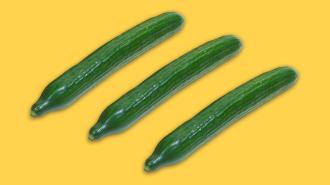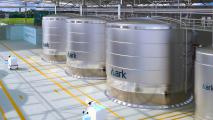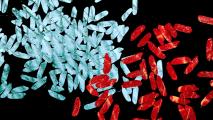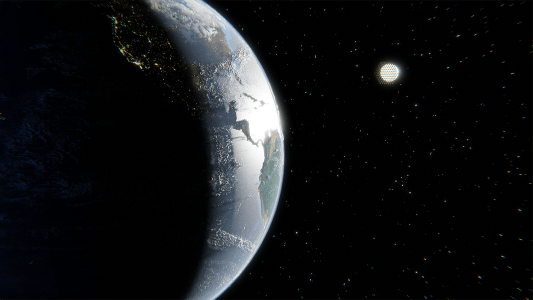Canadian farmers are coating their cucumbers in an edible spray that delays spoilage — keeping the vegetables fresh longer while helping reduce plastic pollution.
The challenge: The natural skin on a cucumber keeps oxygen out and moisture in, which helps delay spoilage. However, some farmers also wrap their cucumbers in plastic, providing an extra layer of protection that can increase the veggies’ shelf life by up to 15 days.
That helps prevent food waste, but it also puts more single-use plastics into the world — the amount used to protect a single English cucumber, for example, is equivalent to five plastic straws.
Apeel’s coating is made from ingredients found in the peels, seeds, and pulp of plants we already eat.
The idea: We no longer have to choose between minimizing food waste or plastic waste — thanks to Apeel Sciences, we can have our cukes and eat them, too.
The Bill Gates-backed startup has developed an edible coating that can be sprayed onto produce to provide an extra layer of protection — it works just like plastic, but without the negative impact on the environment.
This odorless, tasteless coating is made from ingredients found in the peels, seeds, and pulp of plants we already eat. It has been deemed safe to eat by the FDA and can now be found on avocados, apples, and other produce at tens of thousands of stores across the globe.
“Apeel’s unique plant-based protection keeps cucumbers just as fresh as plastic wrap.”
Ravi Jolly
What’s new? In August 2021, Apeel announced that it had struck a deal with its first Canadian supplier, Westmoreland Topline Farms, to eliminate the use of single-use plastics on the company’s English cucumbers.
The farm is now shipping those plastic-free cucumbers to retailers in the US and Canada, and before the end of 2022, it expects the partnership to reduce its plastic output by 185,000 pounds — about as much as 8.5 million water bottles.
“With consumers looking for simple ways to shop more sustainably, removing single-use plastics in the produce department just makes sense,” said Ravi Jolly, Apeel’s VP of New Products. “Apeel’s unique plant-based protection keeps cucumbers just as fresh as plastic wrap, resulting in less food waste and less plastic pollution.”
The big picture: Apeel isn’t alone in looking for ways to reduce plastic pollution from food packaging without sacrificing shelf life — a team from Harvard recently unveiled a removable, biodegradable coating that could delay spoilage on everything from avocados to steaks.
If these technologies become widespread, they could have a significant impact on efforts to reduce plastic pollution, but until then, consumers can do their part by opting for unwrapped produce when possible and making a plan to eat it before it goes bad.
We’d love to hear from you! If you have a comment about this article or if you have a tip for a future Freethink story, please email us at [email protected].






